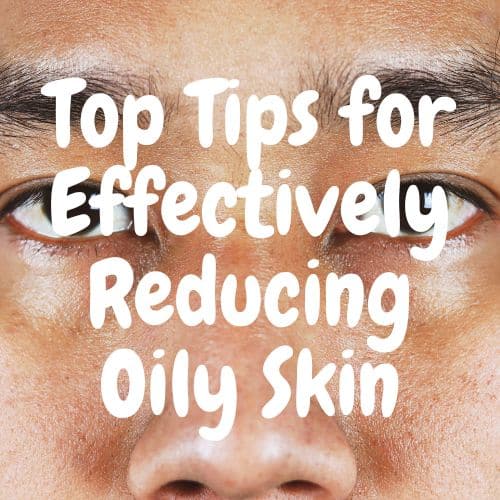Oily skin is a common problem that many people face. As someone who has struggled with oily skin for years, I know how frustrating it can be to feel like your face is constantly greasy and shiny. It’s not just about appearances, either – oily skin can also lead to acne breakouts and other skin issues.
In this article, we will look at some of the top tips for effectively reducing oily skin and maintaining a clear and healthy complexion. Together, we’ll look at the causes of oily skin, how to get rid of oily skin naturally, and how to clear oily skin through a proper skincare routine, home remedies, and diet adjustments. By the end of the article, you will have the tools and knowledge necessary to say goodbye to greasy and confidently embrace a grease-free life.
Understanding the Causes of Oily Skin
Before we dive into how to get rid of oily skin, it’s essential to understand the root causes of this common skin issue. Oily skin is primarily caused by overactive sebaceous glands, which produce excess sebum, an oily substance that helps protect and hydrate the skin. However, when too much sebum is produced, it can lead to a shiny, greasy appearance and acne.
There are several factors that contribute to oily skin, including genetics, hormonal changes, diet, and environmental factors. Some people are genetically predisposed to having oily skin, which means that if your parents have oily skin, you are more likely to have it as well. Hormonal changes, particularly during puberty, pregnancy, and menopause, can also lead to increased sebum production. Furthermore, a diet high in fats and sugars can contribute to oily skin, as can living in a humid environment. By understanding the causes of your oily skin, you can target the problem more effectively and find solutions that work for you.
How to Get Rid of Oily Skin Naturally
Now that we’ve gone over the causes of oily skin, let’s discuss how to get rid of oily skin naturally. The first step in reducing oily skin is to ensure you are following a proper skincare routine. This includes cleansing your face twice a day, using a gentle cleanser specifically designed for oily skin. It’s essential to avoid harsh soaps and cleansers that can strip the skin of its natural oils, as this can cause the sebaceous glands to produce even more sebum.
Next, make sure to exfoliate your skin regularly, ideally once or twice a week. Exfoliation helps remove dead skin cells and unclog pores, reducing the likelihood of acne breakouts. Choose a gentle exfoliant that won’t irritate your skin, such as a product containing salicylic acid or glycolic acid.
Finally, don’t forget to moisturize your skin daily, even if it feels oily. Opt for an oil-free, non-comedogenic moisturizer that won’t clog your pores. This will help keep your skin hydrated and prevent excess oil production.
The Role of Diet in Managing Oily Skin
Your diet plays a significant role in the appearance and health of your skin, including how oily it is. Consuming a balanced diet rich in fruits, vegetables, whole grains, and lean proteins can help improve your skin’s overall health and reduce oiliness. In particular, focus on incorporating foods high in vitamins A, C, and E, as well as omega-3 fatty acids, which can help regulate sebum production and promote healthy skin.
In addition to eating a nutrient-rich diet, it’s essential to avoid foods that can contribute to oily skin. This includes fried foods, processed snacks, and foods high in sugar and refined carbohydrates. These types of foods can lead to inflammation and increased sebum production, worsening oily skin issues.
Skincare Routine for Oily Skin
In addition to the tips discussed earlier, it’s crucial to establish a consistent skincare routine specifically tailored to oily skin. This routine should include the following things:
-
- Cleansing: Cleanse your face twice a day with a gentle, oil-free cleanser. Avoid using hot water, as it can strip the skin of its natural oils, and opt for lukewarm water instead.
- Toning: After cleansing, use an alcohol-free toner to help balance the skin’s pH levels and remove any remaining impurities.
- Exfoliating: Exfoliate your skin once or twice a week with a gentle exfoliant, focusing on areas prone to oiliness and breakouts.
- Treating: If you have acne-prone skin, use a spot treatment containing salicylic acid or benzoyl peroxide to target blemishes.
- Moisturizing: Apply an oil-free, non-comedogenic moisturizer to your face daily to keep your skin hydrated without causing breakouts.
- Sun Protection: Use broad-spectrum sunscreen with an SPF of at least 30 every day, even if it’s cloudy outside. Opt for an oil-free, non-comedogenic sunscreen to avoid clogging your pores.
Home Remedies for Oily Skin
In addition to following a proper skincare routine and making dietary changes, there are several home remedies that can help reduce oily skin. Some of these remedies include:
-
-
- Clay Masks: Using a clay mask once or twice a week can help absorb excess oil and unclog pores. Look for masks containing kaolin or bentonite clay, which are particularly effective for oily skin.
- Honey: Honey has natural antibacterial and humectant properties, making it an excellent natural remedy for oily skin. Apply a thin layer of raw honey to your face, let it sit for 10-15 minutes, then rinse with lukewarm water.
- Aloe Vera: Aloe vera has soothing and anti-inflammatory properties and can help reduce oiliness. Apply a thin layer of pure aloe vera gel to your face and let it dry, then rinse with lukewarm water.
- Apple Cider Vinegar: Dilute one-part apple cider vinegar with three parts water and use it as a natural toner after cleansing. The acetic acid in the vinegar can help balance your skin’s pH levels and reduce oiliness.
-
Always be sure to patch-test any new home remedies on a small area of skin before applying them to your entire face to avoid potential irritation.
When to See a Dermatologist for Oily Skin Issues
While the tips and remedies discussed in this article can be effective in reducing oily skin for many people, it’s essential to recognize when it’s time to consult a dermatologist. If your oily skin is causing severe acne breakouts, persistent redness, or pain, it’s crucial to seek professional help. A dermatologist can assess your skin’s condition and recommend appropriate treatments, which may include prescription medications or procedures such as chemical peels or laser therapy.
How to Maintain Clear and Healthy Skin
To keep your skin clear and healthy, it’s essential to continue practicing the tips and habits discussed in this article. In addition to following a consistent skincare routine, eating a balanced diet, and using home remedies as needed, consider incorporating the following preventive measures into your daily life:
-
-
- Avoid Touching Your Face: Touching your face can transfer dirt, oil, and bacteria from your hands to your skin, exacerbating oiliness and causing breakouts. Make a conscious effort to keep your hands away from your face as much as possible.
- Change Pillowcases Regularly: Pillowcases can harbor dirt, oil, and bacteria, which can contribute to oily skin and acne. Change your pillowcases at least once a week to minimize exposure to these irritants.
- Manage Stress: Chronic stress can lead to hormonal imbalances that contribute to oily skin and acne. Implement stress-reducing techniques such as exercise, meditation, or deep breathing exercises to help keep your skin in check.
-
Recommended Products
La Roche-Posay Effaclar Purifying Foaming Gel Cleanser
This oil-free cleanser is specially formulated for oily skin types. It gently removes impurities and excess oil without over-drying the skin.
Neutrogena Oil-Free Moisture Broad Spectrum SPF 15
This lightweight, non-greasy moisturizer is designed to hydrate oily skin without clogging pores. It also contains SPF 15 to protect the skin from sun damage.
COSRX BHA Blackhead Power Liquid
This exfoliating toner contains beta hydroxy acid (BHA) to help unclog pores and prevent blackheads. It also helps to reduce the appearance of pores and improve skin texture.
Mario Badescu Drying Lotion
This spot treatment is designed to target pimples and blemishes. It contains salicylic acid and calamine to help dry out and shrink pimples overnight.
Conclusion
Oily skin can be a frustrating and persistent problem, but with the right knowledge and tools, you can effectively reduce oiliness and maintain clear, healthy skin. By understanding the causes of oily skin, following a proper skincare routine, making dietary changes, and incorporating home remedies and preventive measures, you can say goodbye to greasy and confidently embrace a grease-free life. Remember that consistency is key – stick to your skincare routine and healthy habits, and you will see improvements in your skin’s appearance and health over time.



